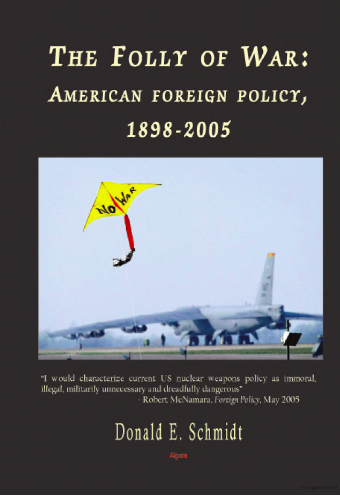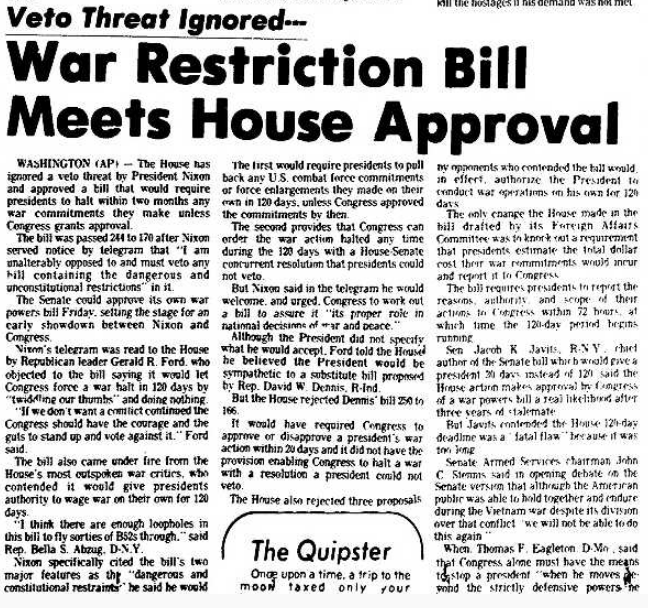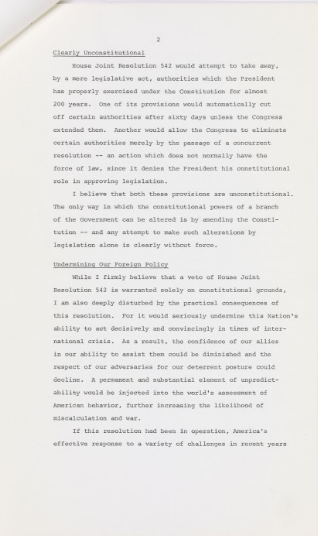The Korean War
President Truman On Korea: Addressing the Nation
Harry Truman. “President Truman addresses the nation on the issue of Korean War and signs an emergency proclamation in Washington D.C.” Washington, D.C., December 18, 1950.
President Harry Truman’s June 27, 1950 broadcast to the nation and the world was given for the purpose of informing the world of the United States’ intervention into the Korean conflict. Truman’s announcement was not given for the purpose of asking Congress to declare war like those of his recent predecessors. The United States was undertaking the major military operation, he explained, to enforce a United Nations resolution calling for an end to hostilities and to stem the spread of communism in Asia. Fortunately for him, his decision was met with overwhelming approval from Congress and the public despite the fact he did not ask for a declaration of war. The Korean War was the first war that the U.S. participated in under the orders of a president without a formal declaration of war. This sets the precedent for later presidents to wage war without Congress’ explicit consent thus increasing presidential war powers.
The Folly of War: American Foreign Policy, 1898-2005, book by Donald E. Schmidt (2005)

In chapter ten of this book written by Donald E. Schmidt, the focus is put on the Korean War and the controversies that surrounded it. A particular focus is placed on the decision to go to war by President Truman, who purposefully did not seek a congressional declaration of war. Prior to making the decision, Truman spoke to the members of his administration but also reached out to a friend of his, Tom Connally, who was at the time serving as a senior Senator from Texas. Asking Connally about involving Congress in the decision to go to war, the senator responded saying “if a burglar breaks into your house, you can shoot him without going down to the police station and getting permission” [1]. With this, Truman’s friend assured him that the president had the sole power to go to war when urgency demands it. The urgency in this case refers to the invasion of communist Northern Koreans into the south. Truman, claiming that the fight was a cause that could not wait for congressional approval due to the idea that communism could take over the world, fought on the basis protecting democracy and containing communism.
The Vietnam War
“War Restriction Bill Meets House Approval,” Odessa American Newspaper, July 19, 1973

This news article from the Odessa American, a newspaper out of Texas, writes in reference to the proposed bill by the House that would restrict the president’s ability to make war. The article specifies that the “bill would require presidents to halt within two months any war commitments they make unless Congress grants approval.” The bill itself is a reaction to the Vietnam War that was currently going on at the time. President Nixon’s predecessor, Lyndon B. Johnson, was the president that brought the United States into a war without congressional approval but Nixon continued the war efforts despite still not asking for nor receiving a formal declaration. The sustained presidential war-making with no declaration, caused Congress to move forward with legislation that would hinder a president’s ability to commit troops abroad and virtually put an end to the, as Congress would refer to it, illegal decisions that presidents were making. Upon hearing of this proposed legislation, Nixon sent a telegram to the House, writing that he would veto any bill that comes across his desk that resembles the one that was currently in the works. However, the House and Congress in general, virtually ignored the telegram and continued to work towards decreasing the powers that Nixon, and the presidents that came before him, had been accumulating overtime.
Nixon Follows Through and Vetoes

Richard Nixon. “Vetoing House Joint Resolution 542,” Sent to Congress on October 24,1973.
Written by President Nixon to the House of Representatives on October 24, 1973, this letter was used to notify the House of his decision to veto the War Powers Resolution as well as to inform them as to why he came to this decision. Within the letter Nixon stated that the resolution’s restrictions on executive power would undermine the nation’s ability to respond to international crises. Nixon also claimed that only a constitutional amendment could limit presidential power and thus the resolution in and of itself was unconstitutional. Nixon had previously informed Congress of his plan to veto should the bill pass through both houses. The passing of this bill after Congress overrode the veto on November 7, showed an effort by the legislative branch to curb the growing war powers of the president. However, this act has never been used against a president and, to this day, presidents claim its unconstitutionality, siding with their predecessor.
Notes
- Donald E. Schmidt. “The Folly of War: American Foreign Policy, 1898-2005.” (New York: Algora Publishing, 2005), 248.
